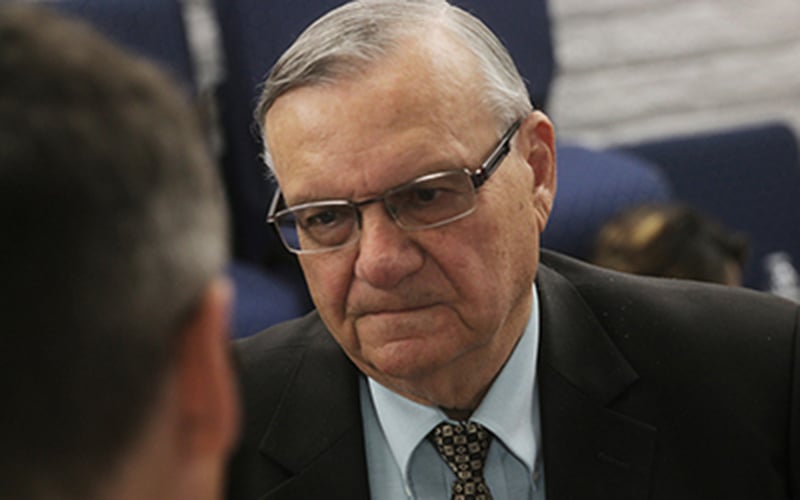WASHINGTON – Former Maricopa County Sheriff Joe Arpaio may be out of trouble, but he’s not getting out of the limelight.
Just days after President Donald Trump pardoned Arpaio late Friday for a criminal contempt of court conviction, the former sheriff was musing Monday about remaining active in Arizona politics.
While he would not commit to any decision, he said in telephone interview that he is keeping his options open, including a possible run for a state office. Arpaio did have a campaign bank account of more than $460,000 at the end of April, according to his latest campaign filing with the Maricopa County Recorders Office.
Political consultants downplayed Arpaio’s claims he might run, saying it’s likely no more than him trying to get attention – and draw attention to his campaign and legal defense funds. But a state Democratic Party official said that while the party does not see Arpaio as a viable candidate for any office in the state, it will be ready to challenge him if he decides to run in the future.
As recently as Friday afternoon, Arpaio was facing the possibility of jail time for his conviction on a criminal contempt of court charge for failing to abide by a court order that his deputies stop targeting Hispanics in traffic stops.
But President Donald Trump pardoned Arpaio late Friday evening, citing the 85-year-old former sheriff’s age and his career of “selfless public service.”
Arpaio was one of the earliest supporters of Trump’s presidential campaign, and he has expressed disdain in the past for fellow Republicans who have not embraced the president. He said Monday that he has not discussed a potential campaign with anyone in the party and, when pressed, would not discuss potential races.
“Look, I’ll say it again, I could run but I’m keeping my options open,” he said Monday.
Mike Noble, of Scottsdale-based MBQF Consulting, said he has seen this kind of behavior from Arpaio in the past, when he floated the idea of running for governor without following through.
Noble said he suspects Arpaio, like many political figures, is just saying he might run again to remain politically relevant and perhaps capitalize on recent headlines to raise money for his legal fund. The key to raising money, Noble said, is keeping supporters invested in the candidate and his message, which he said Arpaio appears to be doing.
“The key of politics, whether you’re in politics or not, it’s about trying to stay relevant because if you let it sit for too long it could go stale – your donors, your supporters, etc.,” Noble said. “You have to keep them engaged … who knows what Joe will end up doing?”
Enrique Gutierrez, communications director for the Arizona Democratic Party, said a lot of Democrats also think Arpaio is seeking attention. But if Arpaio is serious, Gutierrez said the party will stop him “just like we did last election,” referring to current Sheriff Paul Penzone’s defeat of Arpaio at the polls in November.
Gutierrez said the idea that what he called a “conspiracy theory activist” like Arpaio thinks he can address the problems of everyday Arizonans is “insane.”
According to Maricopa County Recorder’s Office records, Arpaio disbanded his 2016 campaign organization on July 6 – the same day he filed a statement of organization creating a new campaign committee. An official in the office said that timing is not unusual.
In his last finance report with the office, Arpaio reported having $463,140.01 in his campaign account.
A candidate manual from the recorder’s office said any funds left in a campaign account can be used in several ways: returned to contributors, donated to a tax-exempt charity or political party, or used to pay any outstanding debts to the state. The money cannot be used for personal expenses.
Campaign committees cannot officially close and must continue to file finance reports until all of the money is disbursed along those lines.
